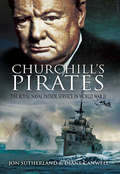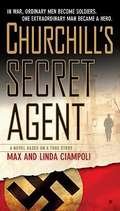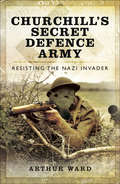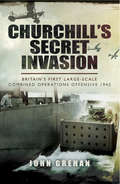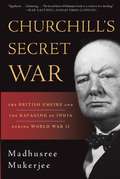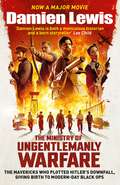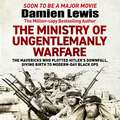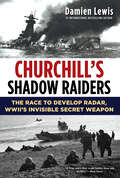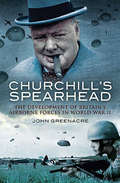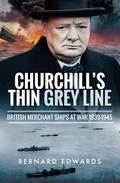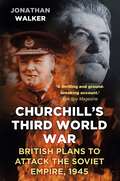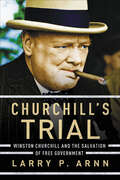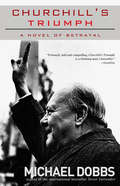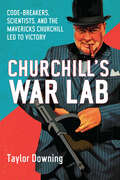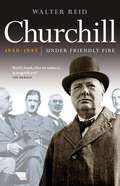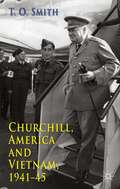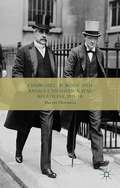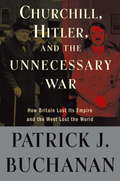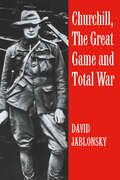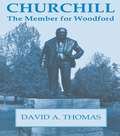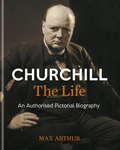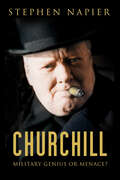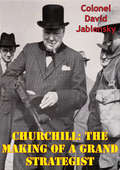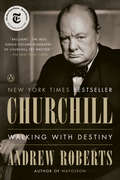- Table View
- List View
Churchill's Pirates: The Royal Naval Patrol Service in World War II
by Diane Canwell Jon SutherlandThe Royal Naval Patrol Service, or Harry Tates Navy as it was commonly known, was a unique service with its own rules and regulations. The officers and seamen were mainly ex-fishermen who had manned trawlers in Icelandic waters. The service was armed mostly with obsolete weaponry and suffered heavy casualties in the early stages of the war. The service was not confined to the seas around Britain and their small trawlers, drifters, paddle steamers, yachts and tugs saw service as far away as the Mediterranean and Newfoundland coast. Their main tasks included convoy escort duties, mine sweeping and anti-submarine work. Many awards for bravery were won including a VC.
Churchill's Secret Agent
by Max and Linda CiampoliBased upon Max Hardonniere's own experience as a covert operative during World War II, this is the story of a young man whose acquaintance with Prime Minister Winston Churchill would lead to him being recruited and trained as a spy who would fight his own war from behind enemy lines.
Churchill's Secret Defence Army: Resisting the Nazi Invader
by Arthur WardBy the spring of 1940, the phoney war suddenly became very real. In April Hitler's forces, invaded Norway and a month later began their assault on France and the Low Countries. The Anglo/French allies were routed. The British escaped to fight another day after evacuating the bulk of their armies at Dunkirk. When on 10 May Winston Churchill became Prime Minister he soon discovered that the nation's defenses were in a parlous state and a Nazi invasion was a very real possibility. By the end of the month, nearly a million British citizens had joined the Local Defense Volunteers, soon to become the Home Guard, of Dad's Army fame. Churchill, however, realized the Home Guard was initially of little more than PR value, an important morale booster. A more serious deterrent needed to be created if Hitler's panzer divisions and the full might of the blitzkrieg were to be thwarted. Consequently, to supplement the sorely ill-equipped regular forces (all of their tanks and most of their artillery had been abandoned in France) a new, British resistance force was required. The intentionally blandly named Auxiliary Units might have been the answer. Formed in the Summer of 1940, in great secrecy, this force of 'stay behind' saboteurs and assassins was intended to cause havoc behind the German front line should the Wehrmacht gain a foothold in Britain. Their mission was to go to cover, hiding in underground bunkers for the first 14 days of invasion and then springing up, at nightfall, to gather intelligence, interrogate prisoners, destroying fuel and ammunition dumps as they went about their deadly business. Each Auxilier knew his life expectancy was short, a matter of weeks. He also knew he could not tell a soul about his activities, even his spouse. 'Dads Army' they were not. Following the publication of his 50th anniversary history of the Battle of Britain, A Nation Alone, written in association with the RAF Museum, Arthur Ward looked deeper into the story of the Invasion Summer of 1940 and enjoyed unique opportunities to interview those involved with Auxiliary Units at the very top and in the front line, as volunteers in a six-man cell.
Churchill's Secret Invasion: Britains First Large Scale Combined Offensive 1942
by John GrehanIn the spring of 1942 Britain's far-flung empire was in the greatest peril. North Africa was being overrun by the German Afrika Korps and in south-east Asia the forces of Imperial Japan had captured Singapore and were threatening India. Only the most urgent reinforcement of both war fronts could prevent disaster. But Britain's shipping routes to Egypt and India passed the island of Madagascar. If the Japanese Navy, operating out of Madagascar, could severe Britain's communications with Cairo and Delhi, then the whole of North Africa and the Indian sub-continent would be at the mercy of the Axis Powers. In a desperate race against time, and under conditions of the utmost secrecy, at Churchill's instigation Britain planned to seize Madagascar, the fourth largest island in the world, before the Japanese could strike. An overwhelming force was assembled and despatched as part of the largest convoy ever to have left Britain's shores. Yet the expedition's commanders were faced with not just military but also political obstacles, because the forces occupying the island were not those her enemy's but those of her former ally - France. The Secret Invasion is the first book to examine in detail this crucial campaign which was Britain's largest amphibious assault since the First World War and the first large-scale combined air, sea and land operation Britain had attempted.
Churchill's Secret War: The British Empire and the Ravaging of India during World War II
by Madhusree MukerjeeA dogged enemy of Hitler, resolute ally of the Americans, and inspiring leader through World War II, Winston Churchill is venerated as one of the truly great statesmen of the last century. But while he has been widely extolled for his achievements, parts of Churchill's record have gone woefully unexamined. As journalist Madhusree Mukerjee reveals, at the same time that Churchill brilliantly opposed the barbarism of the Nazis, he governed India with a fierce resolve to crush its freedom movement and a profound contempt for native lives. A series of Churchill's decisions between 1940 and 1944 directly and inevitably led to the deaths of some three million Indians. The streets of eastern Indian cities were lined with corpses, yet instead of sending emergency food shipments Churchill used the wheat and ships at his disposal to build stockpiles for feeding postwar Britain and Europe.Combining meticulous research with a vivid narrative, and riveting accounts of personality and policy clashes within and without the British War Cabinet, Churchill's Secret War places this oft-overlooked tragedy into the larger context of World War II, India's fight for freedom, and Churchill's enduring legacy. Winston Churchill may have found victory in Europe, but, as this groundbreaking historical investigation reveals, his mismanagement--facilitated by dubious advice from scientist and eugenicist Lord Cherwell--devastated India and set the stage for the massive bloodletting that accompanied independence.
Churchill's Secret Warriors: The Explosive True Story of the Special Forces Desperadoes of WWII
by Damien LewisOne of the most remarkable stories in the history of Special Forces' operations - Daily ExpressIn the bleak moments after defeat on mainland Europe in winter 1939, Winston Churchill knew that Britain had to strike back hard. So Britain's wartime leader called for the lightning development of a completely new kind of warfare, recruiting a band of eccentric free-thinking warriors to become the first 'deniable' secret operatives to strike behind enemy lines, offering these volunteers nothing but the potential for glory and all-but-certain death. Churchill's Secret Warriors tells the story of the daring victories for this small force of 'freelance pirates', undertaking devastatingly effective missions against the Nazis, often dressed in enemy uniforms and with enemy kit, breaking all previously held rules of warfare. Master storyteller Damien Lewis brings the adventures of the secret unit to life, weaving together the stories of the soldiers' brotherhood in this compelling narrative, from the unit's earliest missions to the death of their leader just weeks before the end of the war.
Churchill's Secret Warriors: The Explosive True Story of the Special Forces Desperadoes of WWII
by Damien LewisOne of the most remarkable stories in the history of Special Forces' operations - Daily ExpressIn the bleak moments after defeat on mainland Europe in winter 1939, Winston Churchill knew that Britain had to strike back hard. So Britain's wartime leader called for the lightning development of a completely new kind of warfare, recruiting a band of eccentric free-thinking warriors to become the first 'deniable' secret operatives to strike behind enemy lines, offering these volunteers nothing but the potential for glory and all-but-certain death. Churchill's Secret Warriors tells the story of the daring victories for this small force of 'freelance pirates', undertaking devastatingly effective missions against the Nazis, often dressed in enemy uniforms and with enemy kit, breaking all previously held rules of warfare. Master storyteller Damien Lewis brings the adventures of the secret unit to life, weaving together the stories of the soldiers' brotherhood in this compelling narrative, from the unit's earliest missions to the death of their leader just weeks before the end of the war.
Churchill's Secret Warriors: The Explosive True Story of the Special Forces Desperadoes of WWII
by Damien LewisIn the bleak moments after defeat on mainland Europe in winter 1939, Winston Churchill knew that Britain had to strike back hard. So Britain's wartime leader called for the lightning development of a completely new kind of warfare, recruiting a band of eccentric free-thinking warriors to become the first 'deniable' secret operatives to strike behind enemy lines, offering these volunteers nothing but the potential for glory and all-but-certain death. Churchill's Secret Warriors tells the story of the daring victories for this small force of 'freelance pirates', undertaking devastatingly effective missions against the Nazis, often dressed in enemy uniforms and with enemy kit, breaking all previously held rules of warfare. Master storyteller Damien Lewis brings the adventures of the secret unit to life, weaving together the stories of the soldiers' brotherhood in this compelling narrative, from the unit's earliest missions to the death of their leader just weeks before the end of the war.(P)2014 WF Howes Ltd
Churchill's Shadow Raiders: The Race to Develop Radar, World War II's Invisible Secret Weapon
by Damien LewisFrom bestselling and award-winning war reporter Damien Lewis and for fans of Erik Larsen&’s The Splendid and Vile and Alex Kershaw&’s The Forgotten 500 comes a thrilling account of one of the most daring raids of WWII…the true story of the race to stop Hitler from developing a top-secret weapon that would change the course of history. "One of the most readable World War 2 history books I have read in years&” —We Are the Mighty In the winter of 1941, as Britain faced defeat on all fronts, an RAF reconnaissance pilot photographed an alien-looking object on the French coast near Le Havre. The mysterious device—a &“Wurzburg Dish&”—appeared to be a new form of radar technology: ultra-compact, highly precise, and pointed directly across the English Channel. Britain&’s experts found it hard to believe the Germans had mastered such groundbreaking technology. But one young technician thought it not only possible, he convinced Winston Churchill that the dish posed a unique and deadly threat to Allied forces, one that required desperate measures—and drastic action . . . Capturing the radar on film had been an amazing coup. Stealing it away from under the noses of the Nazis would be remarkable. So was launched Operation Biting, a mission like no other. An extraordinary &“snatch-and-grab&” raid on Germany&’s secret radar installation, it offered Churchill&’s elite airborne force, the Special Air Service, a rare opportunity to redeem themselves after a previous failed mission—and to shift the tides of war forever. Led by the legendary Major John Frost, these brave paratroopers would risk all in a daring airborne assault, with only a small stretch of beach menaced by enemy guns as their exit point. With the help of a volunteer radar technician who knew how to dismantle the dish, as well as the courageous men and women of the French Resistance, they succeeded against all odds in their act of brazen robbery. Some would die. Others would be captured. All fought with resolute bravery . . . This is the story of that fateful night of February 27, 1942. A brilliantly told, thrillingly tense account of Churchill&’s raiders in their finest hour, this is World War II history at its heart-stopping best. &“This highly informative book almost reads like a genuine techno-thriller."—New York Journal of Books &“A little-known behind-the-lines spectacular led by two heroic British officers.&”—Kirkus Reviews &“Anyone who wants to learn more about the origins of the British Special Forces should read this book. It intertwines historical research and eyewitness testimony to tell the untold story of heroism, courage, and ingenuity.&”—Military Press &“Lewis presents a richly detailed and nail-biting tale.&” —Library Journal
Churchill's Spearhead: The Development of Britain's Airborne Forces in World War II
by John GreenacreThis book covers the inception, growth and employment of Britains airborne forces (parachute and glider-borne formations) between June 1940 and March 1945. It takes a comparative approach and follows tailored lines of development. Each of these lines—politics and policy, equipment and technology, personnel and training, command and control and concepts and doctrine—influence each other.The contents include:Politics and Policy: The political environment within which the major decisions were made concerning the concept of development of Britains airborne forces. Churchills personal contribution, the effect of inter-service rivalry and the influence of other government departments. Equipment and Technology: The methods and obstacles of procuring and supplying the bespoke equipment required by airborne forces. The supply of combat equipment, the provision of support aircraft and the procurement of gliders. Personnel and Training: The effort incurred to man the new force and the effect of different approaches to recruitment and training. The selection and recruitment of airborne personnel, the individual training of paratroops and glider pilots and the role of collective training prior to operations. Command and Control: The ability of individuals in key appointments to influence the path of development and the operational and tactical employment of the force. The reaction and approach of higher commanders to the new capability, the selection and impact of commanders within the airborne force and the influence of the airborne staff. Concept and Doctrine: Examines the manner in which Britains airborne forces were employed and performed on operations in the Mediterranean and northwest Europe. How the development of the airborne concept was influenced by physical constraints (equipment and personnel), the ideas of higher commanders and the German example. The impact of individual commanders and physical limitations.
Churchill's Thin Grey Line: British Merchant Ships at War 1939–1945
by Bernard EdwardsThe naval historian and retired merchant navy captain recounts the contributions of Britain’s civilian ships during WWII in this “cracking read” (The Bridgend & Porthcawl Gem). The first British casualties of the Second World War were not members of the Royal Navy, the army, or the Royal Air Force. They were British merchant seamen on the transatlantic passenger liner SS Athenia, torpedoed by a German U-30 submarine on September 3, 1939. For the duration of the war, Britain’s merchant fleet performed a vital role, carrying the essential supplies that kept the country running during the darkest days and made victory possible. Their achievements came at a terrible cost with 2,535 British oceangoing merchant ships being sunk and, of the 185,000 men and women serving in the British Merchant Navy at the time, 36,749 sacrificed their lives. Another 4,707 were wounded and 5,720 ended up as prisoners of war. Their casualty rate of twenty-five percent was second only to RAF Bomber Command’s. Thoroughly researched and full of fascinating true accounts, Bernard Edwards’s Churchill’s Thin Grey Line tells the inspiring story of those brave civilian volunteers who fought so gallantly to defend their ships, cargo, and country. “A cracking read which brings home to the reader how much we in [England] owe to the Merchant Navy . . . Bernard Edwards has done them proud.” —The Bridgend & Porthcawl Gem
Churchill's Third World War: British Plans to Attack the Soviet Empire 1945
by Jonathan WalkerAs the war in Europe entered its final months, the world teetered on the edge of a Third World War. While Soviet forces hammered their way into Berlin, Churchill ordered British military planners to prepare the top secret Operation Unthinkable - the plan for an Allied attack on the Soviet Union - on 1 July 1945. Using US, British and Polish forces, the invasion would reclaim Eastern Europe. The controversial plan called for the use of Nazi troops, and there was the spectre of the atomic bomb. Would yet another army make the fatal mistake of heading East? In Churchill’s Third World War Jonathan Walker presents a haunting study of the war that so nearly was. He outlines the motivations behind Churchill’s plan, the logistics of launching a vast assault against an enemy who had bested Hitler, potential sabotage by Polish communists, and he speculates whether the Allies would have succeeded had the operation gone forward. Well supported by a wide range of primary sources from the Churchill Archives Centre, Sikorski Institute, National Archives and Imperial War Museum, this is a fascinating insight into the upheaval as the Second World War drew to a close and former alliances were shattered. Operation Unthinkable became the blueprint for the Cold War.
Churchill's Trial: Winston Churchill and the Salvation of Free Government
by Larry P. ArnnNo statesman shaped the twentieth century more than Winston Churchill. To know the full Churchill is to understand the combination of boldness and caution, of assertiveness and humility, that defines statesmanship at its best. With fresh perspective and insights based on decades of studying and teaching Churchill, Larry P. Arnn explores the greatest challenges faced by Churchill over the course of his extraordinary career, both in war and peace—and always in the context of Churchill&’s abiding dedication to constitutionalism.Churchill&’s Trial is organized around the three great challenges to liberty that Churchill faced: Nazism, Soviet communism, and his own nation&’s slide toward socialism. Churchill knew that stable free government, long enduring, is rare, and hangs upon the balance of many factors ever at risk. Combining meticulous scholarship with an engrossing narrative arc, this book holds timely lessons for today. Arnn says, &“Churchill&’s trial is also our trial. We have a better chance to meet it because we had in him a true statesman.&”In a scholarly, timely, and highly erudite way, Larry Arnn puts the case for Winston Churchill continuing to be seen as statesman from whom the modern world can learn important lessons. In an age when social and political morality seems all too often to be in a state of flux, Churchill&’s Trial reminds us of the enduring power of the concepts of courage, duty, and honor.--Andrew Roberts, New York Times bestselling author of Napoleon: A Life and The Storm of WarLarry Arnn has spent a lifetime studying the life and accomplishments of Winston Churchill. In his lively Churchill&’s Trial, Arnn artfully reminds us that Churchill was not just the greatest statesman and war leader of the twentieth century, but also a pragmatic and circumspect thinker whose wisdom resonates on every issue of our times.--Victor Davis Hanson, senior fellow, The Hoover Institution, Stanford UniversityIn absorbing, gracefully written historical and biographical narration, Larry Arnn shows that Churchill, often perceived as inconsistent and opportunistic, was in fact philosophically rigorous and consistent at levels of organization higher and deeper than his detractors are capable of imagining. In Churchill&’s Trial Arnn has rendered great service not only to an incomparable statesman but to us, for the magnificent currents that carried Churchill through his trials are as admirable, useful, and powerful in our times as they were in his.--Mark Helprin, New York Times bestselling author of Winter&’s Tale and In Sunlight and in ShadowChurchill&’s Trial, a masterpiece of political philosophy and practical statesmanship, is the one book on Winston Churchill that every undergraduate, every graduate student, every professional historian, and every member of the literate general public should read on this greatest statesman of the twentieth century. The book is beautifully written, divided into three parts–war, empire, peace–and thus covers the extraordinary life of Winston Churchill and the topics which define the era of his statesmanship. --Lewis E. Lehrman, cofounder of the Lincoln and Soldiers Institute at Gettysburg College and distinguished director of the Abraham Lincoln Association
Churchill's Triumph
by Michael DobbsFrom Michael Dobbs, author of the book that inspired the smash hit Netflix series House of Cards, Churchill's Triumph transports us to the end of WWII as the three most powerful men on earth-Winston Churchill, Franklin D. Roosevelt, and Joseph Stalin-gather in what will later become known as the Yalta Conference to discuss the possibility of worldwide peace. Despite their shared goals, these supposed allies will lie, cheat, and deceive each other in order to secure their respective places in history. Dobbs takes you behind the scenes and brings you into the minds and hearts of the big three leaders: the dominating and seemingly all-powerful Joseph Stalin, with the largest army, and the mission of expanding the Soviet Empire; an ailing and fragile Roosevelt, willing to make whatever compromises he felt he had to in order to bring Stalin and Russia into the final campaign against Japan; and Churchill, the least powerful of the three, but the most far-sighted, who could not count on Roosevelt as his ally, and could not tame the avaricious Russian bear, determined to gobble up the nations around and beyond it. Like a fly on the wall of history, the reader becomes a hidden witness to these monumental negotiations, witnessing negotiations that would betray the heroic struggle of millions who died and fought in the Great War. Acclaimed author Michael Dobbs allows the reader to eavesdrop on the world's most powerful men at a crucial point in modern history. Praise for Churchill's Triumph by Michael Dobbs, bestselling author of House of Cards, the book that inspired the Netflix series starring Kevin Spacey: "His portrait of Churchill is as masterly as ever: a wonderful compound of bluster, sentimentality, grumpiness and indefatigable physical energy. There are the usual elegant metaphors... In the tragedy of Poland burning while statesmen fiddled, Dobbs has found a theme worthy of his powers." --Sunday Telegraph "How do you delight the profit-maximising big retailers while at the same time writing something dark and moving? Michael Dobbs knows how...Dobbs knows his sources, but the dialogue is his own: good, clean, moving briskly and underpinned by the record, it conveys historical truth. As for Poland, it suffered all the horrors. Dobbs writes about the country with tight passion, transferring to his fictional village, Piorun, the rape, murder and savage enforcement by Germans and Russians which, so far away and so little regarded, actually happened. The old women weeping, the houses burned down, the bodies left promiscuously on the street are history set out for the attention of novel-readers, memorable instruction in human grief... Furiously told and compelling, Churchill's Triumph is a thinking man's bestseller." --The Guardian "Dobbs astutely and dramatically portrays the real story of Yalta, the mighty tussle between the three men upon whose political skills and strength of character the rest of the world would depend... The novel is a triumph because of the author's fine appreciation of history and his meticulous eye for detail." --The Times "Michael Dobbs brings the Second World War to a resounding close... Dobbs portrays Churchill as being all too human - oversensitive and easily hurt by friendship betrayed, and conjures up Roosevelt's stricken response beautifully... Dobbs is a fine writer and neatly sums up the appeal of historical novels. Not only can they fill in the gaps left by an inaccurate, incomplete or contradictory factual record, but they can capture the spirit of the thing. Dobbs has certainly done that here." --Daily Telegraph "It's all too easy to forget that you're not reading an insider's account of ht real events that shaped the modern world. Dobbs clearly has an instinctive feel for what makes powerful men tick." --The Mail on Sunday "Although it's a novel rather than a work of non-fiction, Churchill's Triumph brings into vivid focus that one wintry week in Georgia when Europe's fat...
Churchill's War Lab: Code-breakers, Scientists, and the Mavericks Churchill Led to Victory
by Taylor DowningThe essential book on Churchill's passion for innovation and the science of war --from codes to radar to bouncing bombs. indefatigable patriot, seasoned soldier, incomparable orator, and, with Franklin Delano Roosevelt, leader of men --Winston Churchill's greatness in the allies' triumphant victory in World War ii is undisputed. yet, of his many unique qualities, Churchill's enduring legacy is attributable at least in equal part to his unshakeable fascination for the science of war. Churchill's War Lab reveals how Churchill's passion for military history, his inimitable leadership style, and his dedicated support of radical ideas would lead to new technologies and tactics that would enable an allied victory. no war generated more incredible theories, technical advances, and scientific leaps. from the development of radar and the decoding brilliance of Bletchley Park to the study of the D-Day beaches and the use of bouncing bombs, Churchill's War Lab is an exciting new take on Churchill as a complex, powerful, and inventive war leader. .
Churchill, 1940–1945: Under Friendly Fire
by Walter ReidThis &“magnificent&” account of Churchill&’s battles with allies &“is a meticulously researched history, but it is also a very moving human story&” (The Herald). In April 1945, Churchill said to Sir Alan Brooke, Chief of the Imperial General Staff, &“There is only one thing worse than fighting with allies, and that is fighting without them!&” When he became Prime Minister on May 10, 1940, Churchill was without allies. Dunkirk and the Battle of Britain saved Britain from immediate defeat, but it was evident that Britain alone could never win the war. Churchill looked to America. He said that until Pearl Harbor, &“no lover ever studied every whim of his mistress as I did those of President Roosevelt.&” But would Roosevelt have entered the war if Pearl Harbor had not taken place? Until then, his actions were ambivalent, and even afterward, America&’s policy was largely shaped by self-interest and its idea of what a post-war world should be like. Lend-Lease, for instance, was far from what Churchill publicly described as &“the most unsordid act in the history of any nation,&” but rather a tool of American policy. Churchill&’s account of relations with his allies and associates was sanitized for the historical record and has been accepted uncritically. In reality, he had to battle with the generals and the CIGS, Tory backbenchers and the War Cabinet, de Gaulle and the Free French, and—above all—the Americans. Even his wife, Clementine, could on occasion be remarkably unsupportive. He told his secretary, &“The difficulty is not in winning the war; it is in persuading people to let you win it—persuading fools.&” In this book, the acclaimed author of works on twentieth-century military history brings together the results of recent research to create a powerful narrative revealing how much time and energy devoted to fighting the war was excluded from the official accounts: the war with the allies.
Churchill, America and Vietnam, 1941-45
by T. O. SmithPut in the wider context of British imperial and diplomatic aims in 1941-1945, the book clarifies the importance of Vietnam to Britain's regional objectives in Southeast Asia; concluding that Churchill was willing to sacrifice French colonial interests in Vietnam for his all-important 'special relationship' with the United States.
Churchill, Borden and Anglo-Canadian Naval Relations, 1911–14
by Martin ThorntonIn 1911, Winston S. Churchill and Robert L. Borden became companions in an attempt to provide naval security for the British Empire as a naval crisis loomed with Germany. Their scheme for Canada to provide battleships for the Royal Navy as part of an Imperial squadron was rejected by the Senate with great implications for the future.
Churchill, Hitler, and "The Unnecessary War": How Britain Lost Its Empire and the West Lost the World
by Patrick J. BuchananWere World Wars I and II--which can now be seen as a thirty-year paroxysm of slaughter and destruction--inevitable? Were they necessary wars? Were the bloodiest and most devastating conflicts ever suffered by mankind fated by forces beyond men's control? Or were they products of calamitous failures of judgment? In this monumental and provocative history, Patrick Buchanan makes the case that, if not for the blunders of British statesmen--Winston Churchill first among them--the horrors of two world wars and the Holocaust might have been avoided and the British Empire might never have collapsed into ruins. Half a century of murderous oppression of scores of millions under the iron boot of Communist tyranny might never have happened, and Europe's central role in world affairs might have been sustained for many generations.Among the British and Churchillian blunders were:* The secret decision of a tiny cabal in the inner Cabinet in 1906 to take Britain straight to war against Germany, should she invade France* The vengeful Treaty of Versailles that muti- lated Germany, leaving her bitter, betrayed, and receptive to the appeal of Adolf Hitler* Britain's capitulation, at Churchill's urging, to American pressure to sever the Anglo- Japanese alliance, insulting and isolating Japan, pushing her onto the path of militarism and conquest* The 1935 sanctions that drove Italy straight into the Axis with Hitler* The greatest blunder in British history: the unsolicited war guarantee to Poland of March 1939--that guaranteed the Second World War* Churchill's astonishing blindness to Stalin's true ambitions. Certain to create controversy and spirited argument, Churchill, Hitler, and "The Unnecessary War" is a grand and bold insight into the historic failures of judgment that ended centuries of European rule and guaranteed a future no one who lived in that vanished world could ever have envisioned.From the Hardcover edition.
Churchill, the Great Game and Total War (Politics And Military Affairs Ser.)
by David JablonskyInfluenced by what Clausewitz called the "remarkable trinity" - the government, the military and the people - David Jablonsky studies the interaction between Churchill, the British people and the army during World War II. He argues that the great British leader saw civilian supremacy as the rule in total war.
Churchill, the Member for Woodford
by David A. ThomasFor nearly 40 years "among the glades of Epping Forest" Churchill found a base for his parliamentary life. This book relates with anecdotal and archival evidence the attempt to unseat him after what many supporters considered an injudicious Munich speech.
Churchill: An authorised pictorial biography
by Max ArthurWhen Winston Spencer Churchill was born in 1874. No one could have predicted the path that lay ahead. But, as it turned out, from Winston's undistinguished academic career to his front-line experiences as a soldier and journalist whether in India, Sudan or Cuba, and during the Boer War or in the trenches of World War I; through his unparalleled political career with all its ups and downs; to his 'finest hour' leading Britain during World War II, he was never to be far from the world's attention.Now the boy, the soldier, the writer, the orator, the politician, the statesman and the family man are all brought to life in this absorbing illustrated book. Featuring both letters to 'Mama' from the homesick - but rebellious - schoolboy and telegrams to Stalin, it highlights some of the most gripping communications from the Churchill Archives. Facsimiles of hand-annotated speech notes are paired with fascinating memorabilia, such as the poster for the reward for his capture during the Boer War, a specimen of one of his infamous cigars, a favourite gramophone record and his Parliamentary despatch box. This book also showcases pictures from his family photograph collection, providing a more intimate portrait of Churchill the husband, the family man and even Churchill the animal lover. Exhaustively researched, Churchill: The Life includes previously unpublished images - such as Winston as a cadet at Harrow and his casket's final journey into Bladon cemetery - as well as rare images of him as a baby and specially shot artefacts from family archives.Together with his unique selection of images, acclaimed historian Max Arthur's evocative and insightful narrative text gets to the core of Winston's character, using his own words and those of some of those closest to him, to provide a comprehensive study of the man and his life. This is a stunning tribute to a remarkable man.
Churchill: Military Genius or Menace?
by Stephen Napier‘. . . the wonderful thing is that three quarters of the population of this world imagine that Winston Churchill is one of the strategists of history, a second Marlborough, and the other quarter have no conception what a public menace he is and has been throughout the war! It is far better that the world should never know and never suspect the feet of clay on that otherwise superhuman being. Without him England was lost for a certainty, with him England has been on the verge of disaster time and again . . . Never have I admired and disliked a man simultaneously to the same extent’ Field Marshal Sir Alan Brooke, Chief of the Imperial General Staff
Churchill: The Making Of A Grand Strategist
by Colonel David JablonskyStrategy is the calculated relationship of means to ends. At the highest military level, that relationship guides the use of the joint and combined military instrument of power to achieve national military strategic objectives. At the national or grand strategic level, the relationship becomes more complex, dealing with multiple, interrelated objectives that can only be achieved by the coordinated use of all the instruments of national power, to include that of the military. In a rapidly changing, increasingly more complicated and interdependent world, the U.S. military professional needs to understand not only the dynamics of military strategy, but of grand strategy as well.This book examines the evolution of Winston Churchill's understanding of both strategic dynamics. In the author's view, that understanding came about not so much from any detailed, consistent study of great strategists or immutable strategic principles, but rather from on-the-job strategic training throughout an incredibly rich and varied life. In the military sphere, there were at first only his tactical experiences in the small wars in the closing years of the Victorian era. In the First World War, however, Churchill came to appreciate the operational and military strategic levels of war as well. Moreover, it was that conflict which drew him increasingly to the realm of grand strategy in which all the elements of national power were combined to achieve victory in the first total war of this century.
Churchill: Walking with Destiny (Phoenix Giants Ser.)
by Andrew RobertsIn this landmark biography of Winston Churchill based on extensive new material, the true genius of the man, statesman and leader can finally be fully seen and understood--by the bestselling, award-winning author of Napoleon and The Storm of War <p><p> When we seek an example of great leaders with unalloyed courage, the person who comes to mind is Winston Churchill: the iconic, visionary war leader immune from the consensus of the day, who stood firmly for his beliefs when everyone doubted him. But how did young Winston become Churchill? What gave him the strength to take on the superior force of Nazi Germany when bombs rained on London and so many others had caved? In Churchill, Andrew Roberts gives readers the full and definitive Winston Churchill, from birth to lasting legacy, as personally revealing as it is compulsively readable. <p> Roberts gained exclusive access to extensive new material: transcripts of War Cabinet meetings, diaries, letters and unpublished memoirs from Churchill's contemporaries. The Royal Family permitted Roberts--in a first for a Churchill biographer--to read the detailed notes taken by King George VI in his diary after his weekly meetings with Churchill during World War II. This treasure trove of access allows Roberts to understand the man in revelatory new ways, and to identify the hidden forces fueling Churchill's legendary drive. <p> We think of Churchill as a hero who saved civilization from the evils of Nazism and warned of the grave crimes of Soviet communism, but Roberts's masterwork reveals that he has as much to teach us about the challenges leaders face today--and the fundamental values of courage, tenacity, leadership and moral conviction. <P><b>A New York Times Bestseller</b>
